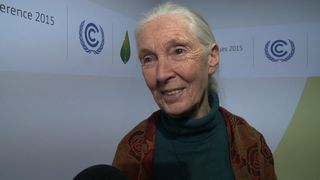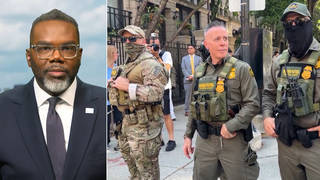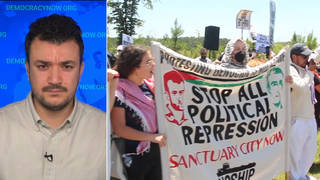
Guests
- Diana ButtuPalestinian human rights attorney and former adviser to the negotiating team of the Palestine Liberation Organization.
After a White House meeting with Israeli Prime Minister Benjamin Netanyahu, President Trump unveiled a 20-point peace plan for the Gaza Strip on Monday that aims to end Israel’s war on Gaza, free the remaining Israeli hostages and remove Hamas from power. Netanyahu expressed support for the deal, but he has already backed away from key elements, including a call for Israel to eventually pull its troops out of Gaza. Hamas has not responded yet to the deal. As part of his 20-point peace plan, Trump announced the establishment of an international transitional governing body called the “Board of Peace,” which Trump would head.
Palestinian human rights attorney Diana Buttu says the deal is “certainly not a plan that is going to end the genocide. What they’re simply attempting to do is repackage it.” Buttu also notes that while Trump met with Netanyahu before announcing the plan, Palestinians were not consulted. Buttu asks, “Why is it that Palestinians have been forced to negotiate an end to their genocide?”
Transcript
AMY GOODMAN: During a White House meeting with Israeli Prime Minister Benjamin Netanyahu, President Trump unveiled a 20-point plan to end Israel’s war on Gaza, free Israeli hostages and remove Hamas from power. On Monday, Netanyahu expressed support for the deal, but he’s already backed away from key elements. Hamas has not responded yet to the deal. The Palestinian Authority and several Arab countries have expressed support for Trump’s proposal. As part of his 20-point peace plan, Trump announced the establishment of an international transitional governing body.
PRESIDENT DONALD TRUMP: To ensure the success of this effort, my plan calls for the creation of a new international oversight body. The Board of Peace, we call it. The Board of Peace. Sort of a beautiful name, the Board of Peace, which will be headed, not at my request, believe me — I’m very busy, but we have to make sure this works. The leaders of the Arab world and Israel and everybody involved asked me to do this. So, it would be headed by a gentleman known as President Donald J. Trump of the United States. … And we’re going to put leaders from other countries on and leaders that are very distinguished leaders. And we’ll have a board. And one of the people that wants to be on the board is the U.K. former Prime Minister Tony Blair, good man, very good man. … Hamas and other terrorist factions will play no role in the board, but they’ll play no role in the governance of Gaza at all, directly or indirectly.
AMY GOODMAN: Israeli Prime Minister Benjamin Netanyahu spoke after President Trump.
PRIME MINISTER BENJAMIN NETANYAHU: I support your plan to end the war in Gaza, which achieves our war aims. It will bring back to Israel all our hostages, dismantle Hamas’s military capabilities, end its political rule and ensure that Gaza never again poses a threat to Israel.
AMY GOODMAN: Trump’s plan outlines steps that could lead to a, quote, “credible pathway to Palestinian self-determination and statehood,” unquote. But after the meeting, Netanyahu said he would, quote, “forcibly resist,” unquote, Palestinian statehood. Netanyahu has also rejected the plan’s call for Israel to eventually pull its troops fully out of Gaza. The two men ultimately refused not to take questions — refused to take questions after their joint statements yesterday at the White House.
We’re joined right now by Diana Buttu, a Palestinian human rights attorney, former adviser to the negotiating team of the Palestine Liberation Organization, speaking to us from Ramallah.
Thanks so much for being with us, Diana. Can you respond to what has been put forward and President Trump being the head of this, what they’re calling a Board of Peace, with Tony Blair one of the key players in this, the former British prime minister?
DIANA BUTTU: Well, this plan that has been put forward is certainly not a plan that is going to end the genocide. What they’re simply attempting to do is repackage it. And the reason that I say this is that what Israel wants is to be able to get the Israelis back, but there is no guarantee whatsoever that they’re going to stop the killing of Palestinians in any way, shape or form. Instead, what we see is that this is a plan in which Israel will continue to have the ability to continue to attack Palestinians, to continue to take over Palestinian land, to continue to attack Palestinian hospitals, schools and so on, with absolutely no oversight and no accountability internationally or otherwise. And the idea that this is being called a peace plan is not only a farce, but is an insult to anybody who actually believes in peace.
JUAN GONZÁLEZ: And, Diana, the proposals talk about the creation of an international stabilization force that would take over from the Israeli military the security of Gaza, but no clear sense of how this force would be created and who — the United States would apparently control it. Could you talk about that, as well?
DIANA BUTTU: Yes, certainly. This plan is actually very, very, very vague, and one of the things that comes out of it is that, to me, it looks as though it’s an Israeli plan that has been repackaged as being an American plan. And I say this because there were no Palestinians who were consulted in the creation of this plan. In fact, it was just Trump who discussed it with Arab leaders, and then Trump discussing it with Netanyahu. He didn’t meet with the Palestinian president. In fact, he didn’t even allow him to travel to the United States for the U.N. General Assembly meeting. And so there’s nothing in there where there’s any form of Palestinian agency. So, they talk about some sort of international force, but it’s not at all clear.
But more than that, when they’re talking about the Israeli — the plan calls for the Israelis to withdraw in stages, but again, at no point is there any guarantee that the Israelis will actually withdraw. All of the guarantees that are mentioned in this document are guarantees that are given to Israel. There’s not a single guarantee that is given to Palestinians. So, once again, rather than this being a document that is leading to the end of Israel’s genocide, it’s actually just a repackaging of it.
And so, this is my fear, is that everybody wants to see an end to this genocide, and this is why you see so many people who have said that they welcome this plan. But the part two of this plan is the part where it is terrifying, where we’re going to see that rather than there being Palestinian agency, instead, the very people who have carried out this genocide, the very people who funded this genocide, are going to be the ones who are going to be in charge of Palestinian lives. And that’s America and the United States — America and Israel.
JUAN GONZÁLEZ: Also, the proposal supposedly recognizes, quote, “the aspirations of the Palestinian people” for their own state, independent state. But as it’s been made clear by Netanyahu, he will oppose that. So, how do you accept a plan, but at the same time reject the key aspect of what the entire struggle of the Palestinian people has been for?
DIANA BUTTU: This is why this is an Israeli proposal that has just been repackaged into an American one. And so, he’s made it clear that he never wants to see a Palestinian state. He’s said this for decades. I just don’t know why people don’t believe him. And now he said it very clearly. And the Americans have also said it very clearly, that they’re not going to see a Palestinian state, either.
Once again, we’re seeing — what we’re seeing is that the Americans and the Israelis, the two parties that have been involved in carrying out this genocide, are going to be the people who are going to rule over the lives of the people over whom they have committed this genocide. And that is a recipe for disaster. I don’t know why this is where the world has allowed this to stand. Why is it that Palestinians have been forced to negotiate an end to their genocide? This doesn’t make any sense.
AMY GOODMAN: Can you talk about the role of the Arab countries, the Gulf countries? You have Netanyahu, apparently, with President Trump, calling the prime minister of Qatar and apologizing for bombing Doha, for violating its sovereignty and killing — well, there were something like six people killed, but apologizing for killing the Qatari security officer, and then Trump now announcing that there’s a deal being made between Israel, Qatar and the United States, what that is. And, of course, it’s in Qatar, where the Hamas officials apparently are going to weigh, apparently as early as today, this deal. The last time they were weighing a U.S. deal, Israel bombed them, though didn’t kill the major figures there.
DIANA BUTTU: Yes. So, this apology was hardly an apology, the fact that it took President Trump to get Netanyahu to make a half-hearted apology. And I think that one of the reasons that Netanyahu didn’t take any questions yesterday was because he didn’t want to answer the question of whether he indeed apologized to Qatar.
But it’s not just a question of an apology. This isn’t the first time that Israel has violated the territorial integrity of a country. Israel has been bombing Lebanon. It’s been bombing Syria. It has been bombing Yemen. It has been bombing Tunisia. And it has been — and it’s been bombing Iran, and, of course, Qatar, as well. And so, the fact that Israel has been allowed to get away with it is the part that is the most disturbing. This is the whole point of the international legal system, is that there should be methods to hold Israel to account. But once again, we see that the United States is giving cover to Israel, and this time, it’s not just giving cover to it, but you see that it’s giving cover to it in such a way that it’s just simply an apology, and that’s it.












Media Options